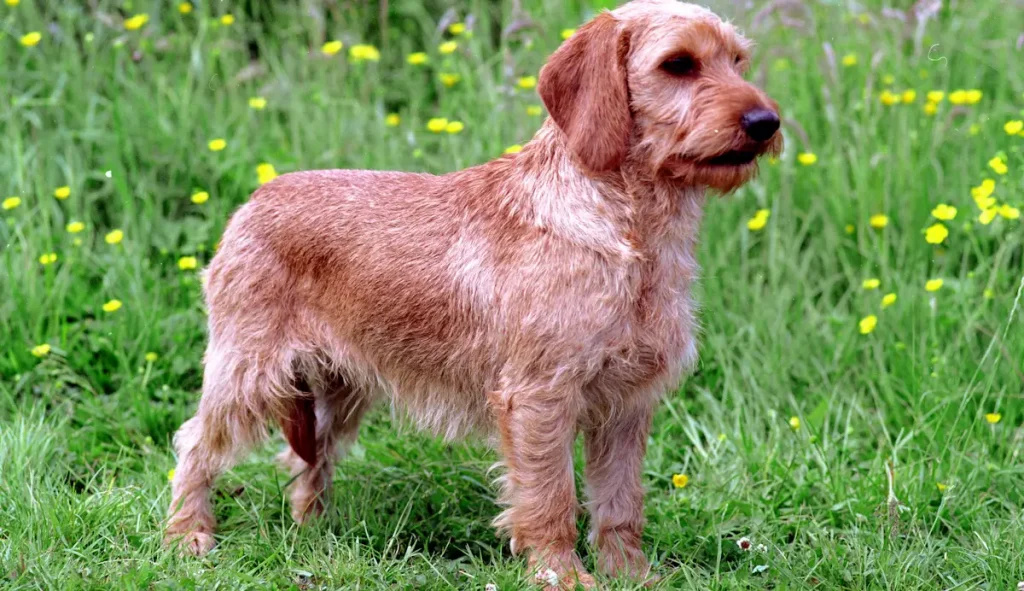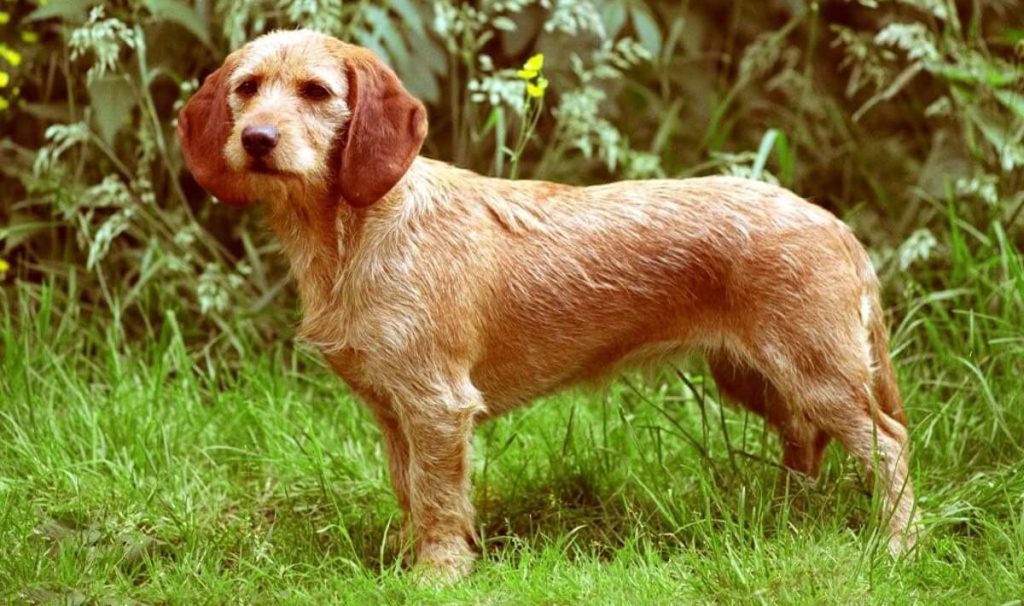In the world of dog breeds, the Basset Fauve De Bretagne stands out with its robust hunting lineage yet displays an affectionate demeanor that belies its tenacious spirit. You’ll find their compact size and rough coat make them distinct in the field, yet these same features contribute to their charm as family pets.
As a dog with a heart for the hunt and a temperament suited for companionship, the Basset Fauve De Bretagne embodies a duality that intrigues. Their keen nose and relentless pursuit in the thicket contrast sharply with their gentle nature at the hearth.
To truly appreciate the complexity of this breed, let’s explore the depths of their character and the essence of their hunting prowess, which has been shaped by centuries of selective breeding. Will their traits prove to be the perfect match for your lifestyle and interests? Join the conversation to uncover the layers of this fascinating breed.
- Noise Level
- Energy
- Sociability
- Trainability
- Care
- Health
Overall
Summary
The Basset Fauve De Bretagne is a moderately noisy breed with high energy levels and a very sociable nature. They are moderately trainable, require moderate care, and generally enjoy good health.
Basset Fauve De Bretagne: Traits, Temperament, and Care Guide
You’ll find the Basset Fauve de Bretagne to be a well-rounded companion, exhibiting a blend of affection and energy that suits both apartment living and active outdoor lifestyles.
Their temperament strikes a balance between loving loyalty and an eager, playful spirit, making them suitable for families with children.
In terms of care, prioritize regular grooming to maintain their wiry coat and incorporate dental hygiene into their routine to ensure their overall well-being.
Understanding the Unique Characteristics of Basset Fauve De Bretagne
Delving into the unique characteristics of the Basset Fauve de Bretagne reveals a breed that’s well-suited for apartment living, not merely due to its size but also because of its adaptable nature.
As a purebred dog, this scent hound possesses the typical basset shape, complete with short legs. Its genetic health necessitates attention; conditions like progressive retinal atrophy warrant early socialization and regular vet check-ups for a thriving companion.
Exploring the Characteristics of the Basset Fauve De Bretagne
When exploring the characteristics of the Basset Fauve de Bretagne, it’s important to note that this adaptable breed can comfortably adjust to apartment living, showcasing its versatility in various living situations.
| Trait | Description | Relevance |
|---|---|---|
| Size | 25-35 lbs, 12-15 inches | Compact for various homes |
| Coat | Dense, wiry, harsh | Low maintenance, bred to hunt |
| Ears | Characteristic drop ears | Signature look, hunting dogs |
| Temperament | Friendly, outgoing | Good with families, pets |
Basset Fauve De Bretagne: A Comprehensive Profile and Guide
You’ll find that the Basset Fauve de Bretagne combines a compact frame with a robust hunting instinct, making them a unique breed among hunting dogs.
Their distinct coat requires specific grooming techniques to maintain its wiry texture and prevent common skin issues.
When considering this breed for your family, it’s essential to assess their exercise needs and compatibility with other pets to ensure a harmonious household.
Everything You Need to Know About the Basset Fauve De Bretagne
Understanding the Basset Fauve de Bretagne, an adaptable and affectionate breed, requires a closer look at its unique characteristics. This small dog’s hound lineage and hunting traits complement its affectionate nature, making it an ideal companion.
The Basset Fauve de Bretagne adapts well to apartment living, making it a suitable choice for those in smaller living spaces. Despite its small size, this breed is kid-friendly and gentle, making it a great addition to families with children.
In terms of appearance, the Basset Fauve de Bretagne comes in main colors such as fawn, wheaten, and red wheaten. However, it is the breed’s friendly, energetic, and healthy disposition that truly sets it apart.

Discovering the Temperament of Basset Fauve De Bretagne
Although known for their sociability and affection, the Basset Fauve de Bretagne possesses a temperament that requires early socialization and training to bring out their best qualities as both a family companion and a skilled hunting partner.
Intelligent yet occasionally stubborn, this dog breed thrives with gentle, consistent guidance. With proper training, they’re good with children and become great companions, embodying the dogs love and loyalty sought after by many.
Basset Fauve De Bretagne: Is It a Good Fit for Families?
When considering the Basset Fauve de Bretagne for your family, you must evaluate its compatibility with your household dynamic.
This breed’s affectionate nature and adaptability to apartment living make it a strong candidate for families, especially those with children. However, you’ll need to factor in their need for consistent training and exercise to ensure they fit seamlessly into your family life.
Assessing Basset Fauve De Bretagne’s Compatibility with Families and Kids
Assessing the Basset Fauve de Bretagne’s compatibility with families and kids reveals that this breed’s affectionate and gentle nature makes it an excellent choice for households with children.
- Adaptable to apartment living; low-energy yet affectionate
- Family-friendly, offering loyalty and love
- Gentle with young children; can handle lively play
- Sweet temperament, but never leave dogs and kids alone together without supervision
Apartment Living With Basset Fauve
The Basset Fauve de Bretagne’s adaptability and calm demeanor make it a suitable companion for apartment dwellers seeking a low-energy, well-mannered pet. Despite their hunting traits, this small Bretagne dog breed can thrive in confined spaces with regular exercise.
Indoor play and brisk walks suffice, fostering a sense of belonging while respecting neighbors’ comfort. Their friendly yet protective nature ensures a harmonious apartment living experience.
Basset Fauve Obedience Tips
When training your Basset Fauve de Bretagne, you must establish a consistent leadership role to counteract their natural stubbornness.
Positive reinforcement techniques, such as treats and praise, are your best tools to maintain their focus and eagerness to learn.
Early socialization and obedience training are imperative for shaping a sociable and well-mannered companion.
Effective Training Strategies
How can you effectively train a Basset Fauve de Bretagne, a breed known for its stubbornness, to ensure it becomes a well-behaved and obedient companion? Use effective training strategies that cater to the unique characteristics of this dog breed. Basset Fauve de Bretagnes require regular, consistent training sessions that incorporate mental stimulation. Positive reinforcement is key. Here’s a detailed table to guide you:
| Age to Start | Training Method | Expected Outcome |
|---|---|---|
| Early Puppy | Positive Reinforcement | Good Behavior Habits |
| Ongoing | Mental Stimulation | Engaged and Responsive |
| Daily | Patience and Consistency | Reduced Stubbornness |
| Young Age | Socialization | Well-Behaved Around Others |
| Regular | Treats and Praise | Increased Obedience |
Basset Fauve De Bretagne Exercise and Grooming Needs
To maintain their health and happiness, Basset Fauve de Bretagne dogs require regular exercise and consistent grooming practices.
- The right amount of exercise, including walks and playtime, is crucial to keep your dog engaged.
- Weekly brushing will manage loose hair and prevent matting.
- Always attend to their ears to ward off infections.
Your Basset Fauve de Bretagne’s grooming needs are as vital as their physical activities for their overall well-being.

Health Considerations for Basset Fauve De Bretagne
In considering the health of your Basset Fauve de Bretagne, it’s important to be aware of certain conditions they’re predisposed to, including progressive retinal atrophy and epilepsy.
You should schedule regular vet check-ups to monitor their health and catch any signs of cardiomyopathy, skin allergies, or thyroid issues early on.
With attentive care, these dogs typically enjoy a robust lifespan of 12 to 15 years.
Common Health Issues and Lifespan
While the Basset Fauve de Bretagne typically enjoys a robust lifespan of 12 to 15 years, prospective owners should be aware of several common health issues that can affect this breed. Regular veterinary check-ups can mitigate risks of cardiomyopathy, skin allergies, and thyroid problems. Genetic testing for conditions like Open Angle Glaucoma is recommended by the Kennel Club to ensure their well-being. Additionally, progressive retinal atrophy and epilepsy are common health issues in this breed.
Alternatives for Basset Fauve de Bretagne: Friendly and Eager Hunting Dogs
For those who appreciate the Basset Fauve de Bretagne’s friendly demeanor and eagerness in hunting, these breeds are known for their affable nature and hunting abilities.
| Similar Dogs | Short Description |
|---|---|
| Basset Hound | A breed with distinctive long ears, known for its sense of smell and gentle character. |
| Beagle | Small but mighty in scent tracking, a popular and friendly family pet. |
| Dachshund | Known for its unique body shape and excellent hunting skills, particularly with burrowing animals. |
| Bloodhound | Renowned for its tracking ability, a gentle and determined breed. |
| Petit Basset Griffon Vendéen | A small, lively hound known for its enthusiasm in the field and friendly nature. |
Is Basset Fauve De Bretagne the Right Pet for You?
Considering a Basset Fauve de Bretagne as your next pet requires a careful assessment of your lifestyle and the breed’s characteristics to ensure a harmonious match.
Fauve de Bretagnes need regular exercise and mental stimulation—factors that make a big difference in their well-being.
Their adaptability and affection make them the right pet for you if you’re committed to take care of their needs and value a companion’s loyalty.
Conclusion
In essence, the Basset Fauve de Bretagne is a vibrant tapestry of canine virtues.
With its affable nature and keen hunting prowess, this breed weaves a rich pattern into the fabric of family and field life.
You’ll find its maintenance a manageable thread to intertwine into your routine, albeit with a few health strings to keep an eye on.
Consider if this hound harmonizes with your life’s melody before adding its cheerful bark to your household chorus.
Frequently Asked Questions
What Do Basset Fauves Hunt?
You’ll find Basset Fauves excel in hunting with their scent tracking, stealthy approach, and quarry pursuits. They use fauve agility for endurance hunting, tapping into cooperative instincts and strong prey drive to catch rabbits and hares.
How Do Basset Hounds Hunt?
You’ll find Basset Hounds master scent tracking, with ground sniffing prowess and tail signaling guiding their pack hunting. They pursue prey with low stamina but high vocal communication, weaving a symphony in the chase.
What Are Unique Traits of a Basset Hound?
You’ll find Basset Hounds have short legs, droopy ears, and wrinkled skin, which contribute to their keen sense for tracking with a strong scent ability, gentle temperament, and a loud bark that signifies their findings.
What Are the Characteristics of the Griffon Fauve De Bretagne?
You’re exploring the Griffon Fauve de Bretagne, known for its rough coat texture, amiable temperament, and moderate size compared to similar breeds. They need regular exercise, have a notable lifespan expectancy, and a rich breeding history.
